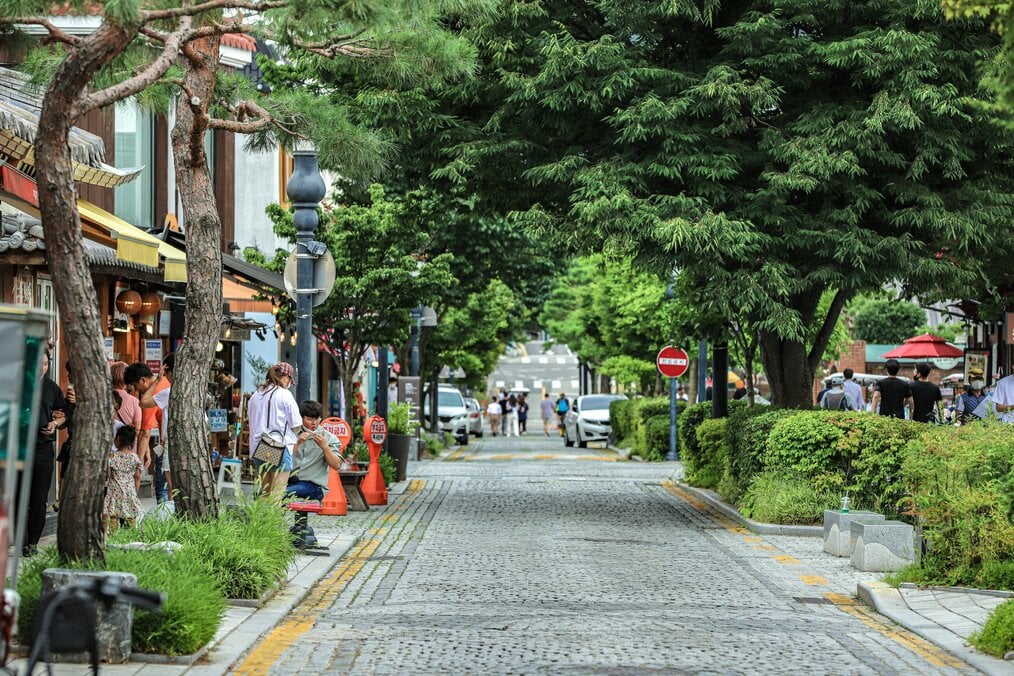
Can You Really Teach English Abroad and Get Free Housing & Airfare? Here's What to Know
Read on to gain insight into the 'too good to be true' benefits of teaching abroad from a teacher!
If you’re thinking of teaching English abroad, you’re probably wondering what the benefits are. In addition to the life-changing benefits of traveling the world, immersing yourself culturally and expanding your comfort zone, you can receive a good salary and immense job perks.
Read on to find out how you can get free airfare and housing while teaching English abroad!
Can you really get free airfare & housing while teaching abroad?
Yes! There are many teaching jobs abroad with accommodation and flight reimbursement provided. However, the job perks will vary from one TEFL job to another according to many different factors.
- TEFL job: Different TEFL jobs range in salary and job benefits. Typically, you’re more likely to receive free or reimbursed airfare and housing (or housing allowance) when working for a reputable school such as an international school. Schools budgets vary, and international schools are among the best privately funded schools and therefore have more room to compensate teachers.
- Country: Job benefits also depend on the country you’ll be teaching English in. In some countries such as China or South Korea, where there’s a high demand for English but also a strong economy, you’ll often find teaching benefits such as free airfare and housing for TEFL teachers at public or private schools.
How to get free airfare and housing while teaching English abroad

Here are some of the steps you can take to find teaching jobs abroad with accommodation, airfare, and other benefits provided!
- Get TEFL certified: Firstly, you’ll need to show that you’re a valuable asset to the ESL classroom. Becoming TEFL certified demonstrates to employers that you’re a skilled and qualified teacher, increasing your employability. It’s also a legal requirement in some countries.
- Choose a location: To find the best place to teach abroad, you’ll want to consider a myriad of factors such as culture, lifestyle compatibility, teacher salary, cost of living, and more. If you’re adamant about maximizing job benefits such as reimbursed airfare and free accommodation, you’ll need to research the common TEFL job perks in specific countries.
- Find a TEFL job: You’ll need to find a TEFL job that offers extensive benefits. You can find TEFL jobs on Go Overseas’ job board, Dave’s ESL Cafe, or through teach abroad programs which guarantee job placement. Typically, international schools offer extensive benefits such as free airfare and housing, but entry requirements are higher. Public and private school jobs in countries such as China and South Korea are most known for offering free accommodation and airfare.
- Apply & interview: Once you’ve found the perfect TEFL job, gather your documents and apply! Ensure that you have the necessary documents such as a valid passport, bachelor’s degree, TEFL certificate or teaching license, and so on. If you receive an interview offer, thoroughly research the school and job requirements, and start preparing for common TEFL interview questions.
- Apply for a visa: Congratulations! After receiving your job offer, you can begin applying for your work visa. You’ll need to legalize documents such as your background check, degree, and TEFL. The school or program will send the necessary documents that you need to complete your visa application.
Read more: How to Avoid Common TEFL Job Scams
Types of TEFL jobs that offer free airfare and housing
Although benefits vary from countries and schools, these are the types of TEFL jobs that offer free airfare and housing:
- International school: International schools are some of the most sought after TEFL jobs because of their high salaries, job perks, and valuable work experience. English teachers at international schools are typically qualified with a CELTA or a teaching license from their home country and have existing teaching experience. Teachers are compensated very well for the high requirements and job responsibilities.
- Public schools: Depending on the country, you may be able to receive reimbursed airfare and/or free accommodation teaching at public schools abroad. Public schools in China, for example, often provide free housing or a housing stipend, and flight reimbursement upon contract completion. Government-sponsored programs such as JET in Japan and EPIK in Korea also offer similar benefits to TEFL teachers. These programs are structured and provide reliable support for first-time teachers.
- Private language academies: Like public schools, some private schools offer teachers benefits such as free airfare and housing. This is mostly common in South Korea, where many first-time teachers teach in private schools or ‘hagwons’.
- Universities: In countries like China, South Korea, or Vietnam, universities may offer free on-campus housing and airfare reimbursement. These jobs typically have fewer contact hours but more preparation and high entry requirements.
- English Teaching Assistant (ETA) Programs: Programs like Fulbright(which is open to US and Canada citizens) or NALCAPin Spain, sometimes include stipends or housing assistance. While airfare isn’t always covered, some placements may offer travel grants or host families that provide room and board.
- Au pair: Although a less conventional form of TEFL teaching, au pair offers benefits such as free accommodation and board, as well as a stipend and potentially even free airfare. An au pair’s responsibilities may include looking after young children, teaching English, general housework, and so on.
Countries that offer free airfare and housing
This chart is here to help give you a general idea of where you’re most likely to find these benefits. Keep in mind, these perks may not apply to every school in the country, but you can use it as a helpful starting point as you explore your options as an ESL teacher!
| Country | Reimbursed airfare | Housing |
|---|---|---|
| China | Yes | Free or subsidized |
| South Korea | Yes | Free or subsidized |
| Japan | No | Free or subsidized |
| Thailand | No | Sometimes |
| Vietnam | No | Sometimes |
| Spain | No | Homestay options |
| UAE | Yes | Free or subsidized |
Read more: Highest Paying Countries for Teaching English Abroad
Types of housing benefits

Housing benefits can come in more ways than one. Here are some of the different housing benefits for English teachers abroad.
- Provided housing: Some schools or education providers will offer teachers free housing and accommodation. Often, these forms of accommodation are clean but modest. They may come in the form of a small apartment.
- Housing stipend: Other schools will offer a housing stipend which may or may not cover the full rent. International schools will often offer a generous housing stipend, where teachers can opt for more high-quality facilities, but public or private schools may offer an amount which covers something more modest.
- Homestays: It’s also an option in some countries to stay in a homestay with a local family. This option is more common in South American countries, and is particularly favorable among teachers who want to improve their second language by practising with the local family.
Common types of perks for ESL teachers
In addition to a salary and potentially free airfare and housing (and an amazing cultural experience!), here are some of the other job perks associated with TEFL:
- Completion bonus: Teachers who are working for an entire academic year - or sometimes even for a semester - may receive a month’s salary as a completion bonus.
- Health insurance: Many companies or schools include some form of health insurance in your teaching contract. While one TEFL job may offer comprehensive health insurance, another may offer something such as accident insurance, so it's important to understand what is and isn’t covered. However, TEFL teachers are still encouraged to get their own personal travel insurance.
- Paid holidays: Many teachers will be able to enjoy national holidays in their country, and these days may also count as paid vacation.
Ask a teacher: What perks did you receive?
Want to hear it from the teachers themselves? Here’s what some teachers across the globe have to say about the job perks they received while teaching English!
“During my first year, I received free airfare and accommodation. The accommodation was great, but after a few years of teaching I was able to get a housing stipend as I looked to move elsewhere in the city.” - Teacher Molly in South Korea
“The long holidays as an English teacher in China gives you so much time to navigate Asia, and I also get housing allowance and flight reimbursement at the end of each term!” -Teacher Sophie in China
“I received a housing stipend which covered my accommodation in rural Thailand. The accommodation was modest, but clean and comfortable.” - Teacher Will in Thailand
Teaching programs that offer free housing or airfare
You don’t need to search far and wide to find a TEFL job that offers you excellent benefits, just take a look at some of our TEFL and teach abroad providers here on GO!
- If you want to teach in China: The Fewer Things, TravelGrad, and Teaching Nomad offer teaching programs with guaranteed placement, free housing, and reimbursed airfare in major cities across China.
- If you want to teach in Japan: JET - or the Japan Exchange and Teaching Program - offers language assistant positions for aspiring teachers who want to work in Japanese public schools. While many positions offer free housing or a stipend, not all do.
- If you want to teach in the United Arab Emirates: You can benefit from not only free housing and airfare but also tax-free salary in an enchanting and luxurious United Arab Emirates with Teach Away.
- If you want to teach in Spain: Greenheart Travel’s 3-month teaching program allows teachers to experience maximal cultural immersion by living with a host family in Spain. This not only covers accommodation but allows for great language development potential!
- If you want to teach in Korea: Korean Horizons and Travel and Teach Recruiting Inc. offer comprehensive plans for ESL teachers. While Korea Horizons is the official recruitment agency of the EPIK program, offering placements in Korean public schools, Travel and Teach Recruiting inc. offer placements in private language schools.
Teach abroad and reap life-changing benefits!
Teaching abroad offers valuable personal, professional, and financial benefits. TEFL teachers are in high demand, especially in Asia and the Middle East, often with perks like free housing and airfare. While these benefits shouldn’t be the only factor in choosing where to go, it’s helpful to understand the common TEFL job benefits in each country. Just remember to review your contract carefully, as perks vary by school!
Learn more about teaching English abroad:






